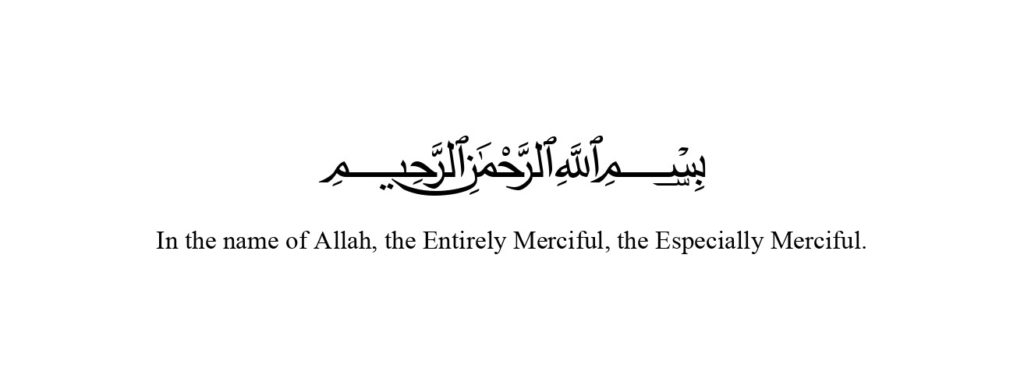

NEWS

Pakistan Flood Making Heroes Out Of Ordinary People
A man is being hailed as a “hidden hero” for his remarkable act of building a bridge in just 36 hours in order to help the people escape the floods. Wajid Ali constructed a wooden bridge across a river in Lower Kohistan.
The bridge built as a temporary structure has become a lifeline for thousands of people who move across for essential supplies, medicines, and treatment.
Wajid Khan, with the help of supplies provided by the Communication and Works (C&W) Department, was able to complete its construction in just 36 hours.
The team with Wajid Khan has now moved up a few kilometers to build another one of these structures to ease the traffic and help people move across for their essential needs.
Pakistan is currently undergoing one of its worst crises following heavy monsoon downpours and melting glaciers in Pakistan’s northern mountain regions. The floodwaters ravaged towns, villages, roads, and bridges claiming the lives of more than 1,400 people and affecting an estimated 33 million more.
The floods have caused severe structural damage throughout the country, with nearly two million homes and businesses destroyed along with 7,000 kilometers of roads and numerous bridges washed away.
Some aid has poured in, and Pakistan is scrambling to deliver it to the people who need it the most. However, reaching the worst-affected areas is a struggle in itself, as mobility through flood-affected areas has been hampered by damaged roads and bridges.
Sherry Rehman, Pakistan’s minister for climate change, warned that the rains, which had abated late last month only to restart this week, are predicted to continue lashing much of the country in the coming weeks.
The perilous situation has also created heroes out of ordinary people who have stepped up to help in their own ways.

Gulf Countries May Ban Netflix If ‘Un-Islamic’ Content Is Not Removed
Likely refers to LGBTQ content particularly targeted at children
Netflix is facing demands from six Gulf States to remove content the states say “violates Islamic and societal values and principles.”
In a joint statement last week, a committee of the Gulf Cooperation Council and the Saudi General Commission for Audiovisual Media said Netflix would face legal action if it didn’t remove offensive content, but did not specify what content.
According to Arab News, the statement said the committee reached out to Netflix about removing the violating content as well as “content directed at children.”
It is likely the statement is a response to LGBTQ content on Netflix’s platform. Bloomberg reported there have been debates in the Gulf about content promoting homosexuality to kids.
The six Gulf States in the council are Bahrain, Kuwait, Oman, Qatar, Saudi Arabia, and the United Arab Emirates.
Al Ekhbariya, a Saudi state TV channel, aired an interview with a family consultant who said Netflix was an “official sponsor of homosexuality.”
“All legal measures will be taken to protect the Kingdom’s sovereignty, citizens and residents from any intellectual attack aimed at affecting its societies, values, safety of upbringing their generations and protecting them from harmful content,” Esra Assery, CEO of the Saudi commission, told Arab News.
King Charles III And His Views On Islam
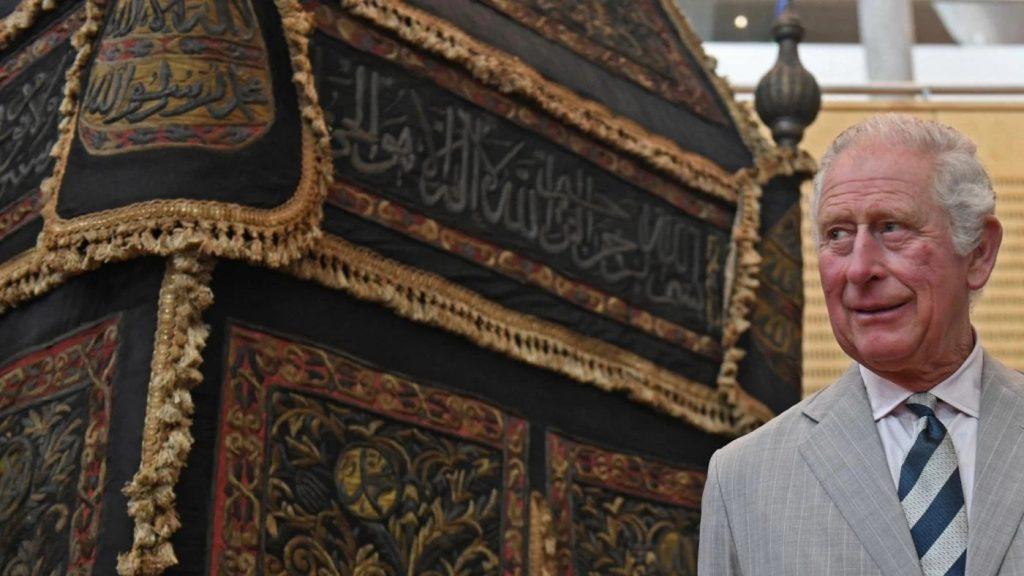
King Charles III, pictured on 19 November 2021, next to the ‘mahmal’, the palanquin formerly used to transport the ‘kiswah’, the cover that engulfs the Kaaba, during a visit to Egypt’s Alexandria. (AFP)
King Charles III has recently garnered a lot of attention since he ascended the throne after the death of his mother, Queen Elizabeth II.
The new British monarch has been in the public eye for decades and has expressed his thoughts openly on a number of cultural and social issues including climate change, politics, and Islam.
According to writer Robert Jobson in his book Charles At Seventy: Thoughts, Hopes and Dreams, the monarch studies the Holy Quran and signs letters to Muslim leaders in Arabic.
Here are some of British monarch’s thoughts on Islam and Muslims as they relate to world issues:
The environment, nature, and Islam
Charles has been an outspoken advocate on environmental issues for decades, urging world leaders to seek immediate and long-term solutions to climate change.
In a speech at the Oxford Centre for Islamic Studies in 2010, Charles spoke about how the west can learn from Islamic principles to save the environment. He said that based on his knowledge of Islam and the Quran, “there are limits to the abundance of Nature.”
“These are not arbitrary limits, they are the limits imposed by God and, as such, if my understanding of the Quran is correct, Muslims are commanded not to transgress them,” Charles, a member of the Church of England, said.
Moreover, in the same speech, he added: “We share this planet with the rest of creation for a very good reason – and that is, we cannot exist on our own without the intricately balanced web of life around us. Islam has always taught this and to ignore that lesson is to default on our contract with Creation.”
Muslim influence on the world
During his 2006 Unity in Faith speech at Al-Azhar University, the world’s second oldest university, he told the audience: “We need to remember that we in the West are in debt to the scholars of Islam, for it was thanks to them that during the Dark Ages in Europe the treasures of classical learning were kept alive.”
At the Markfield Institute of Higher Education in Leicester, he said: “Anyone who doubts the contribution of Islam and Muslims to the European Renaissance should, as an exercise, try to do some simple arithmetic using Roman numerals. Thank goodness for Arabic numerals and the concept of Zero introduced into European thought by Muslim mathematicians!”
Ramadan
At the start of Ramadan this year, Charles said that everyone could learn “from the spirit of Ramadan.”
“Not only the generosity but also abstention, gratefulness and togetherness in prayer which will give great comfort to many across the world,” he said in a statement.
“The generosity of spirit and kind-hearted hospitality of Muslims does not cease to astound me and I am sure that as we enter more uncertain times … the Muslim community will again be a source of immense charitable giving this Ramadan.”
“The generosity of spirit and kind-hearted hospitality of Muslims does not cease to astound me”
King Charles III
Islam and the West
Charles has long advocated for bringing the Muslim world and the West closer, adding there was a lot of “misunderstanding” about Islam in the West.
“If there is much misunderstanding in the West about the nature of Islam, there is also much ignorance about the debt our own culture and civilization owe to the Islamic world. It is a failure which stems, I think, from the straightjacket of history which we have inherited. The medieval Islamic world, from Central Asia to the shores of the Atlantic, was a world where scholars and men of learning flourished. But because we have tended to see Islam as the enemy of the West, as an alien culture, society and system of belief, we have tended to ignore or erase its great relevance to our own history.” he said in 1993 during a much-cited speech at the Oxford Centre for Islamic Studies.
Charles warned that extremism must not be seen as a “hallmark” of Islam, and said it was “no more the monopoly of Islam than it is the monopoly of other religions, including Christianity.”
Byzantine Mosaics Discovered Under Gaza Farm
The mosaics may be over 1600 years old and are in perfect condition
Byzantine mosaics dating from the 5th to the 7th century have been unveiled in the central Gaza Strip on Friday.
Farmer Salman al-Nabahin unearthed the relic six months ago while working in his olive orchard in the Bureij refugee camp. He then spent three months excavating it with the help of his son.
The mosaic floor, boasting 17 iconographies of beasts and birds, is well-preserved and its colours are bright.
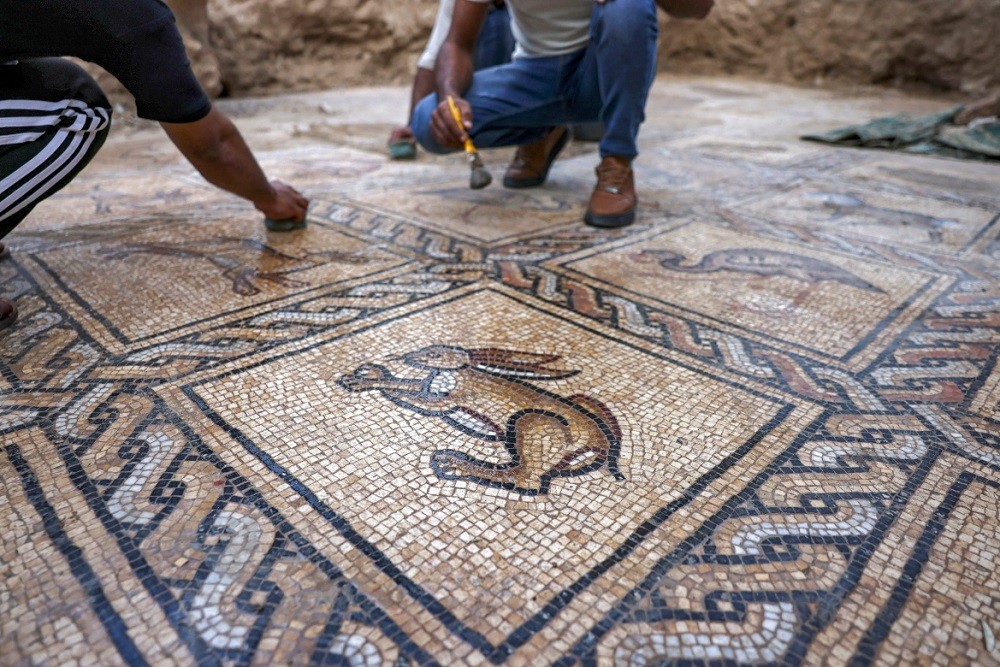
“These are the most beautiful mosaic floors discovered in Gaza, both in terms of the quality of the graphic representation and the complexity of the geometry,” said René Elter, an archaeologist from the French Biblical and Archaeological School of Jerusalem, whose team examined the finds, told the Associated Press.
Elter estimates the mosaic floor dates back to a time between the 5th and the 7th centuries but told AP a proper excavation is needed to determine when exactly it was built and whether it was part of a religious or secular complex.
He has not been able to visit the site but viewed photos and videos taken by local research partners.
The mosaics are the latest in a series of Byzantine archaeological finds in Gaza in recent years.
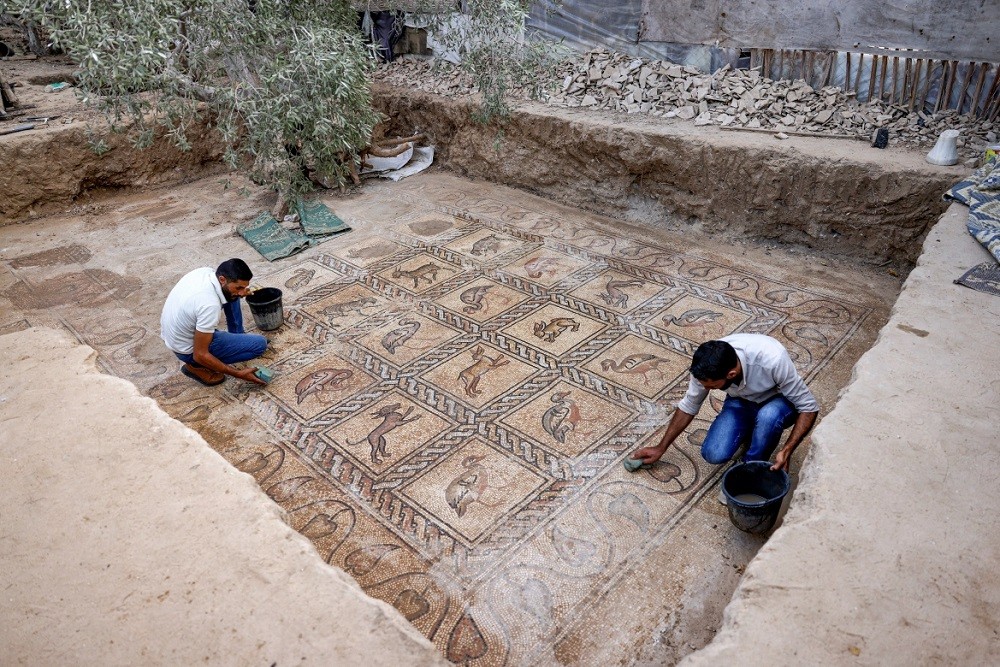
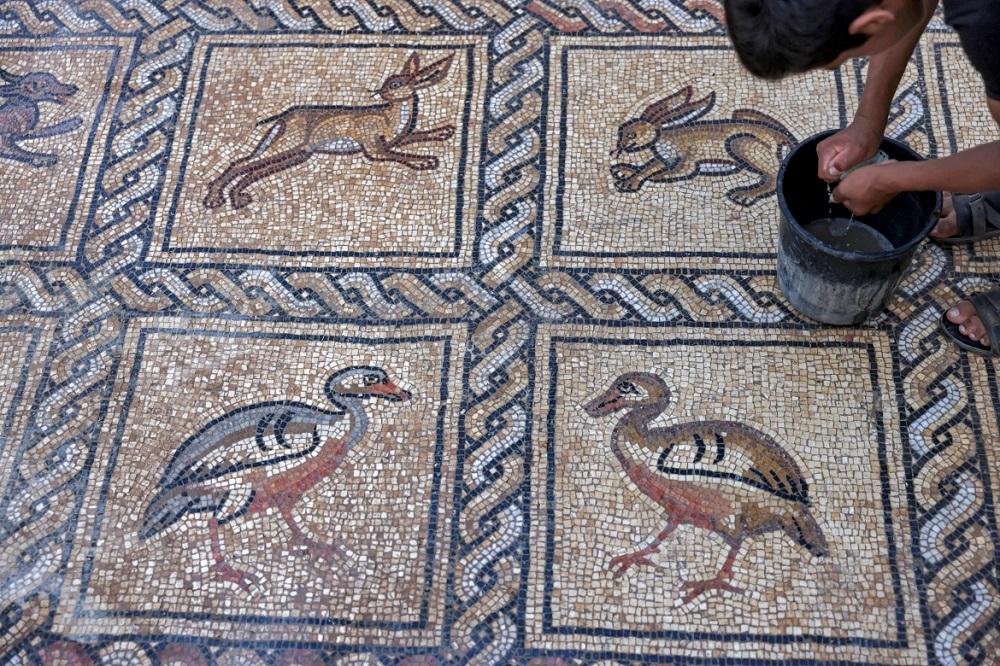
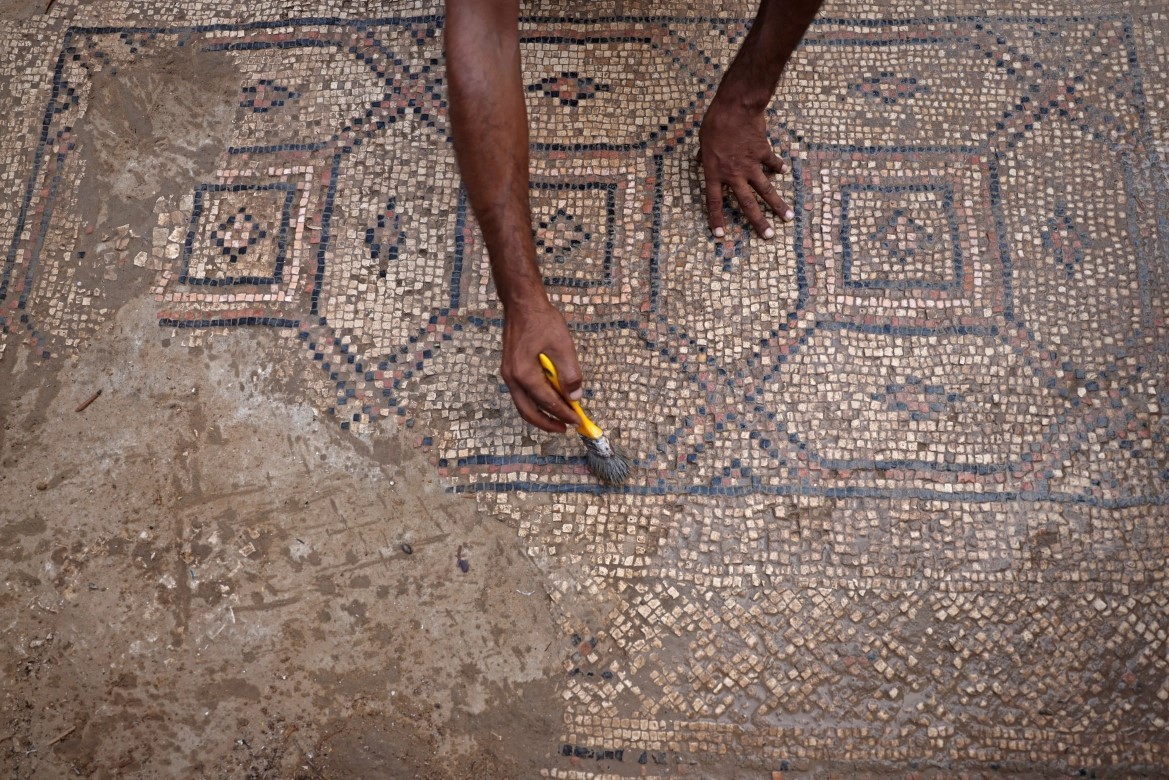
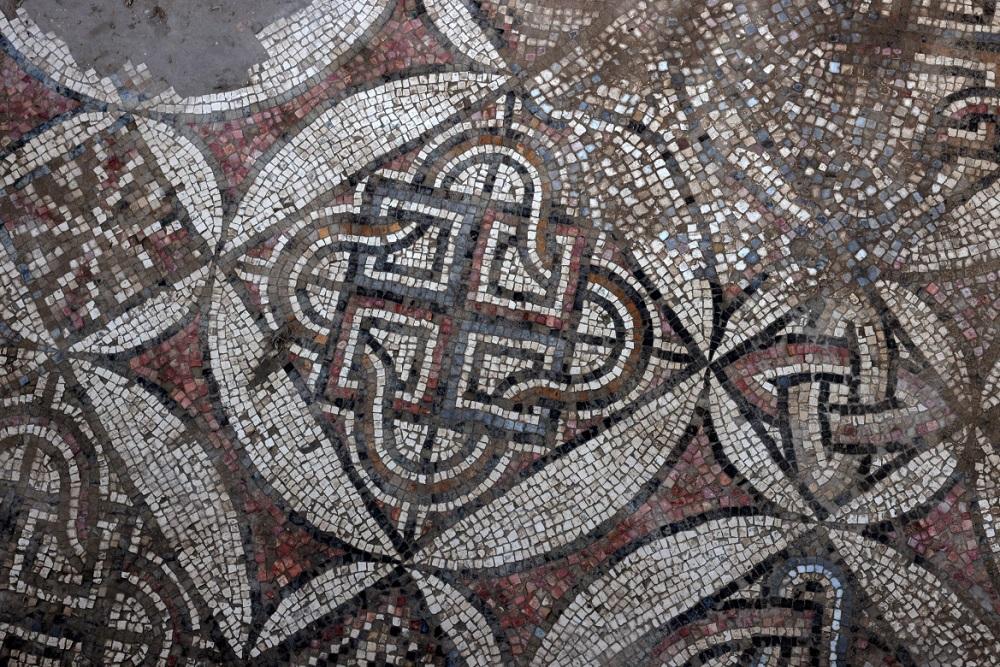
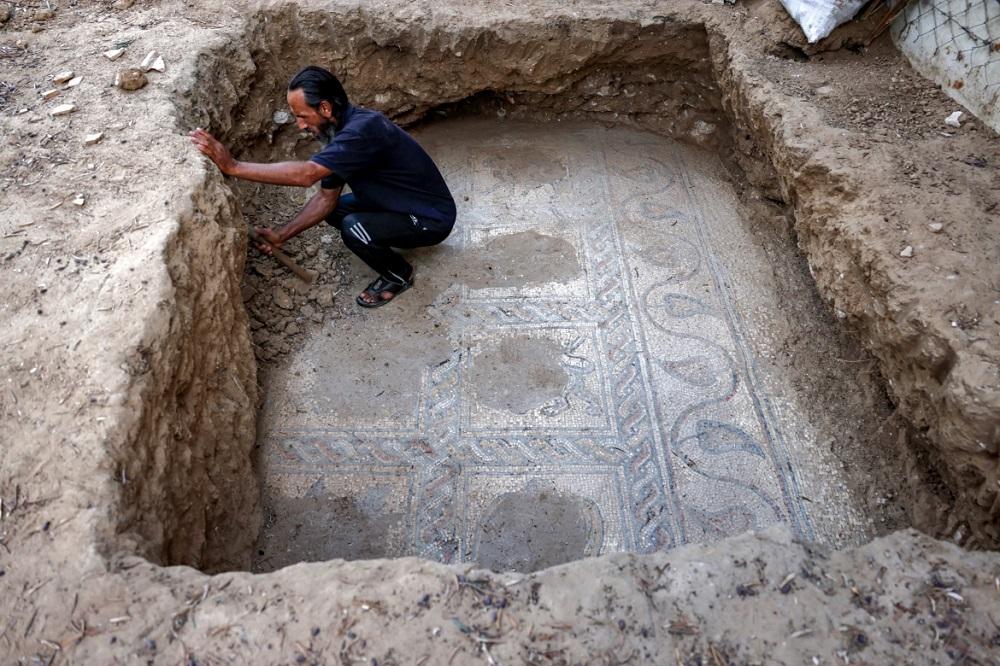
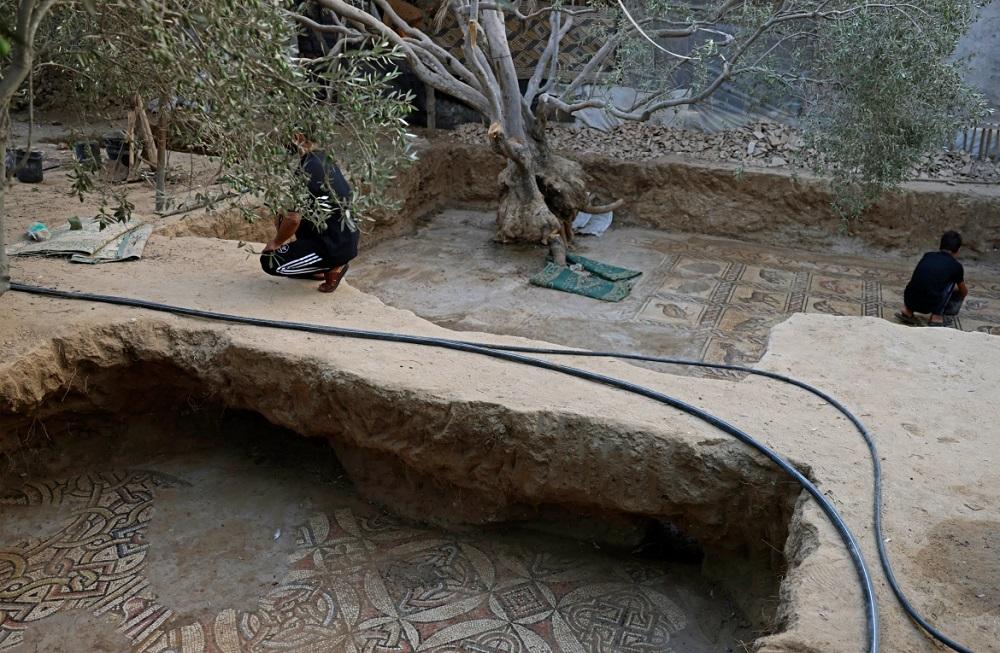
Ukrainian Disabled Man Embraces Islam After Taking Shelter In A Mosque
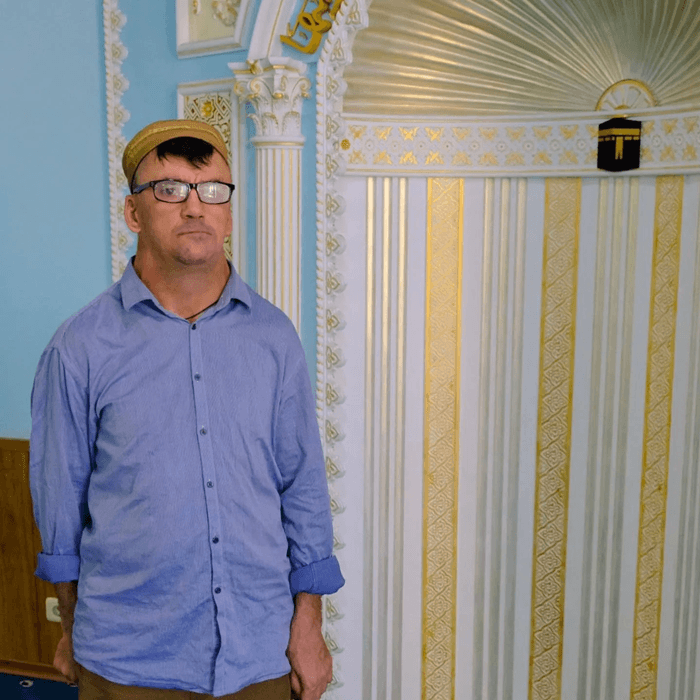
Guidance to Islam is on top of all the countless gifts and blessings Allah bestows upon human beings. It can come anytime; at times during a person’s darkest time as a beacon of light. Such was the case for a disabled Ukrainian man who converted to Islam after taking shelter in a mosque during the Russian attack.
Usually, whenever there was an attack, Voronko Urko, a Ukrainian citizen, and his family went to a shelter. However, on March 8th he was left alone when volunteers separated and took his family somewhere. He began to despair about living without gas, light, or water and reached out to Imam Muhammad Ali for help when the situation became intolerable.
“When the situation became unbearable he called me and said, ‘Ali, please help me’. From that moment on he lived in our mosque and we became brothers”, recounts Imam Ali
After living in the mosque for a while, Voronko Urko got inspired to embrace Islam and become a Muslim. He pronounced his Shahaada on August 20, 2022.
We pray that Allah keeps him steadfast on the deen and reunite him with his family.
ISLAM
When Shaytan makes you question Allah
By Shaykh Muhammad Salih al-Uthaymeen

Thoughts and delusions that are not compatible with religion do not bother a dead heart, because such a heart is already lifeless and ruined and that is all that Satan wants. It was said to one of the pious predecessors: “The Jews and Christians say that they do not suffer from the problem of waswas (insinuous whispers).” He replied: “They are speaking the truth, for what would Satan want with a house that is in ruins?”
On the other hand, if the heart is lively and contains a degree of eeman (faith, belief), Satan will launch a merciless and relentless war against it and will inflict upon it contradictory insinuations about the religion of its owner. This war can be highly destructive if the person succumbs to it.
Satan will go to the extent of making the person skeptical about his or her Lord, religion, and belief. If Satan senses any weakness or defeat in the heart, he will prevail upon it until he drags it to apostasy. But if he finds the heart to be powerful and resistant, he will be disgraced and badly defeated. Nevertheless, all the devilish insinuations that Satan casts on the heart will be ineffective if one uses the cures recommended by the Prophet ﷺ.
Ibn ‘Abbas (May Allah be pleased with him) reported that a man came to the Prophet ﷺ and said: “I experience thoughts about things regarding which I would prefer to become charcoal or ashes than to utter them.” The Prophet ﷺ replied: “Praise be to Allah, Who has sent Satan’s trick back to him.” (An authentic hadith recorded by Abu Dawood and Imam Ahmad)
In another hadith, some of the Companions came to the Messenger of Allah ﷺ and said: “O Messenger of Allah! We get some thoughts in our minds which we consider too awful to express.” The Prophet ﷺ answered: “Is that so?”. They replied: “Yes”. Then he ﷺ said: “That is pure eeman.” (Recorded by Muslim) It is as if the Prophet ﷺ were telling his Companions: ‘The meaning of it being pure eeman is that these emerging insinuations and your shunning of them and regarding them as too horrible will cause no harm to your eeman but it is rather an indication that your eeman is pure and unadulterated.”
The Prophet ﷺ is reported to have said: “Satan may come to one of you and say: Who created so-and-so? Until he says: Who created your Lord? So when he inspires such a question, one should seek refuge with Allah (by saying the istiaadha) and give up such thoughts.” (Recorded by Bukhari and Muslim)
In another version, the Prophet ﷺ said: “One should then say: I believe in Allah and His Messenger.” (Recorded by Muslim)
The Prophet ﷺ also said “The people will nearly ask too many questions, so that one of them may say: ‘Allah created all of creation, but who created Allah?’ If they say this, then say: (Say: He is Allah, [Who is) One, Allah the Eternal Refuge. He neither begets nor is born, nor is there to Him any equivalent.) (Quran 112: 1-4), spit (without actually releasing spittle) to your left three times, and seek refuge with Allah from the devil.” (A sound hadith according to as-Suyooti)
But if he (Shaitaan) finds the heart to be powerful and resistant, he will be disgraced and badly defeated
In all the aforementioned hadiths, the Companions (may Allah be pleased with them all) described the disease to the Prophet ﷺ and he in turn prescribed the treatment for it in the following four actions:
1. Shunning these insinuations entirely, forgetting them as if they had not existed at all and preoccupying oneself with safe thoughts
2. Seeking refuge with Allah from the thoughts and from the accursed Satan
3. Saying the phrase: “I believe in Allah and His Messenger”.
4. Reciting Surah-al-Ikhlaas: (Say: He is Allah, [who is) One. Allah the Eternal Refuge. He neither begets nor is born, nor is there to Him any equivalent.) (Qur’an 112: 1-4) then spitting drily (without spittle) to the left side three times saying: “A ‘oodhu billahi min ash-Shaytan ir-rajeem. (I seek refuge with Allah from Satan, the accursed).”
Reference: Youth Problems by Shaykh Uthaymeen
What is at the center of my life?
By Fatima Khalid
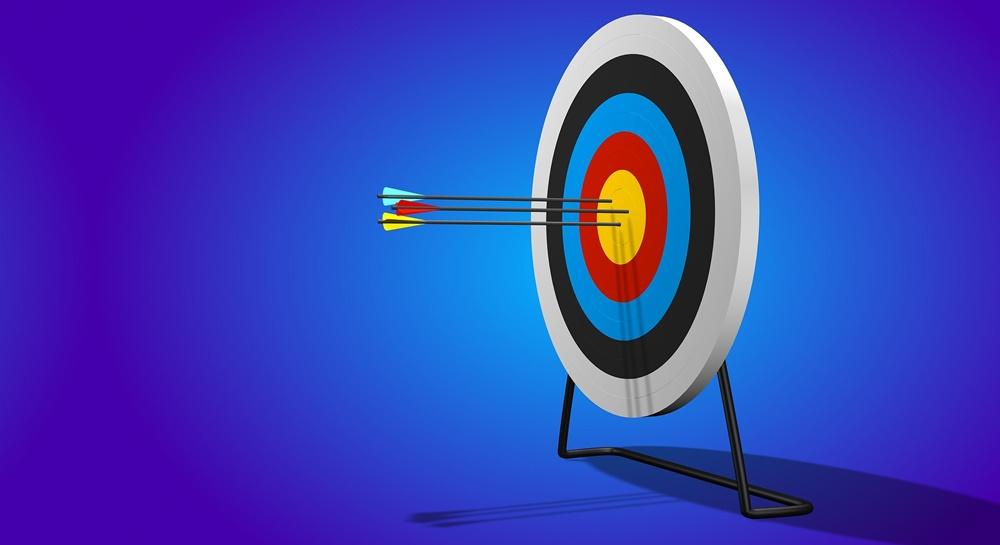
A human being is created with a need for some form of purpose to guide and give meaning to his actions throughout his life. In this overwhelming world a purpose is essential to channel one’s energy. A life’s purpose stabilizes the fluctuations of a person’s personality and circumstances. It is a kind of a guideline which helps us differentiate the unimportant matters from the truly important ones. A purpose to life is essential to drive your actions and lead you to your objective because if you do not know where you are going then you are lost.
Why is a definite life purpose important for us?
A clear defined purpose leads to a conscious life. It guides you when you feel dishelved, provides you with inner peace of knowing where you are going. Every setback in your life becomes trivial. You just learn from your failures and move on.
Conversely, without direction and purpose, people feel lost and frustrated and tend to fall into depression.
Most people consider their life purpose to be some sort of mission they are born to fulfill or do something they are efficient at and passionate about; and they spend their lives in search for such a thing. Mark Twain famously said:
“The two most important days in your life are the day you are born, and the day you find out why.”
As poetic and pleasing as it seems, we know we have only one shot at this life which is short, and the burden of searching for our life’s purpose by ourselves and serving the world in some way through it is difficult.
When you question about their purpose, people respond in a myriad of different ways. Some people do not give it a thought at all, others have vague responses like, “to be my own self,” “to give back to the world,” or “to live my life to the fullest.” Some consider earning an X amount of money or reaching Y position to be their life purpose. Such ideas are good as secondary goals in life but not as life’s main purpose. Making them your life’s purpose is attaching the value of your life to them; so if and when you mess them up or even go on to achieve them, the meaning of life dissipates.
Therefore, it is true that you do need to set goals to organize and achieve things in this world. But your life’s main purpose must be distinct and higher than such trivial gains because all this ceases when we die.
So what should be the ‘prime purpose’ of life?
The easiest way to discover the purpose of an invention is to ask the creator of it. So the easiest way to discover the reason for our existence is to ask Allah for it because He (ﷻ) put us here.
We people actually have it so much easier if we only come to realize that we have the guideline laid out for us. All we need to do is follow it. Allah has not left us in the dark to wonder, guess, attempt, suffer and fail, and then start over and repeat. He (ﷻ) has revealed His Word and sent His Messenger to deliver it. He made sure it was passed down to us. Allah (ﷻ) says:
“I did not create the jinn and mankind except for My worship.”
Quran 51:56
That is our real purpose of life. It’s the same for all mankind. To know and worship Allah (ﷻ). By worship, we mean submitting to the laws of the Creator who created you and everything around you. The objective of our life is to reach paradise which is the reward of willingly submitting to Allah’s commands revealed to His Messenger ﷺ.
In other words, the purpose of our life in this world is to live in accordance to Allah’s will, gain His pleasure and consequently be rewarded with paradise. To achieve this purpose, you must ask yourself this: What is at the center of my life?
Who do you live for? What are you going to build your life around? Career, loved ones, interests, money, or any other activity are all temporary things and should not belong at the center of your life. You need something solid and strong to hold you together when life starts breaking apart. You need an imperturbable center. A resilient connection with your Lord can keep you stable at all times.
When you priortize your Creator in your life, you realize that everything else is just a means to strengthen that connection with Him. And you realize that even during the worst of times you are clinging to your strongest lifeline and sailing ahead.
In conclusion, this life is very meaningful and purposeful to the believing Muslims, as they realize that it will determine their outcome and permanent position in the hereafter.
The Observance Of Al-Mawlid An-Nabawi
By Umm Muhammad
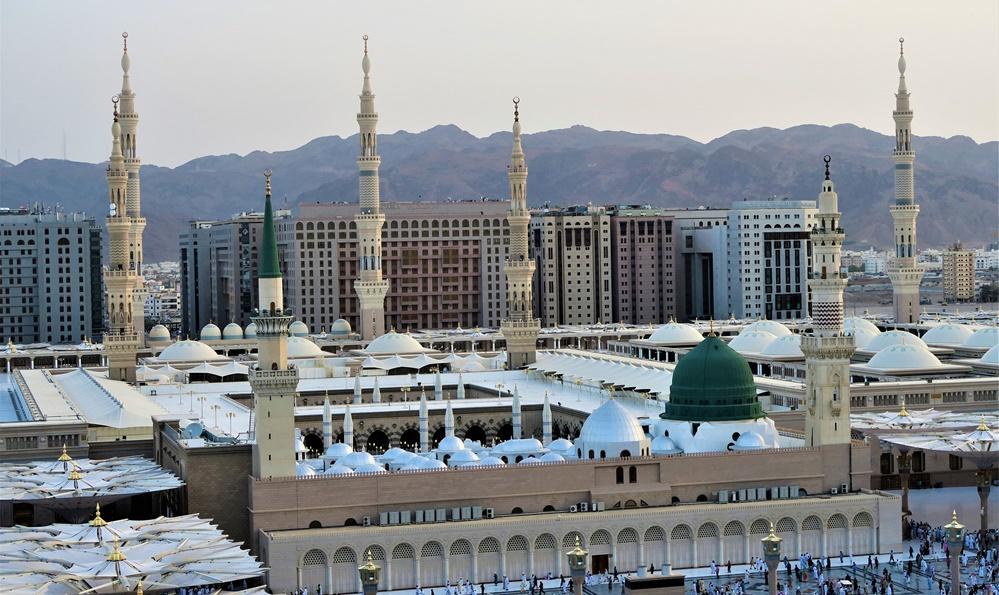
Respect, reverence and love of Allah’s Messenger (ﷺ) is an essential part of faith, for he stipulated: “No one of you is a believer until I am more beloved to him than his parent, his child and all people.” But our love for the Prophet is naturally on a different plane and of a different type than that for others of the human race. This is because our debt to him is far greater than to others, and it was he who was chosen by Allah to deliver the divine message, to invite all people to His religion, and to show them the path leading to His acceptance and pleasure. He spared no effort and no sacrifice in carrying out this duty for the benefit of mankind. Through Prophet Muḥammad (ﷺ), Allah made known truth from falsehood, guidance from misguidance, and wisdom from error. And through him, He showed man how to attain eternal Paradise.
The ṣaḥābah readily demonstrated their love of him by complete obedience and by defense of his person and his sunnah after him. These expressions of fidelity have never been doubted and are as valid today as ever before, remaining obligations upon every Muslim believer.
However, other expressions of affection and attachment to the Prophet (ﷺ) have come into being since that time. Although the community eventually sank into a long period of stagnation and ignorance, the ordinary Muslim seldom lacked enthusiasm and sincerity; what he lacked was knowledge and upright leadership. Conflicting opinions on the subject have led at times to disputes, which in some cases have transgressed the limits of what is lawful in speech and behavior among Muslims. Believers have the right to differ as long as they fear Allah, respect each other and sincerely seek the truth from legitimate sources of Islamic jurisprudence, putting aside personal preference and preconception.
The ṣaḥābah readily demonstrated their love of him by complete obedience…
What Is the Mawlid?
The original Arabic definition of the word “mawlid” is “a place of birth or a time of birth.” This is the only definition known to Muslims from the time of the Prophet until the beginning of the fourth Hijrah century. After that, the term took on another meaning – the gathering of people for the purpose of listening to specific recitations culminating in the story of the Prophet’s birth. Nowadays in some countries, the 12th of Rabī‘ al-Awwal, considered to be the day of birth, is a national holiday. Moreover, the mawlid ceremony is no longer confined to the day or month of the Prophet’s birth but is often held on other happy occasions, such as the birth of a baby, a marriage agreement or relief from some distress, as a kind of thanksgiving in appreciation for Allah’s favor.
The ceremony is often not exempt from forms of shirk in varying degrees, such as the excessive praise in which certain divine characteristics are attributed to the Prophet (ﷺ), while the Messenger (ﷺ) himself warned: “Do not praise me exceedingly as the Christians praised the son of Mary. I am only His servant, so say, ‘the servant of Allah and His messenger.'”
Unfortunately, in some parts of the world where ignorance is still widespread, these excesses are so extreme as to include supplication directed to the Prophet himself or the dedication of sacrificial animals to him. Such manifestations are admittedly due to those peoples’ sincere affection for the Prophet (ﷺ) and for Islam. But lacking adequate knowledge of their religion, they often fall prey to the unscrupulous, who, posing as spiritual leaders, seek to insure popularity through propagation of that which the people already like and accept unquestioningly.
Putting deliberate misguidance aside, however, we may also note that there are a large number of relatively educated Muslims and some Islamic scholars who condone the more moderate form of mawlid celebration as being, if not praiseworthy, at least preferable to the many types of worldly entertainments and empty pastimes to which the masses of common people are normally attached. Even when conceding that the practice is not a part of the sunnah which has come down to us from the Prophet, they see no harm in observing the occasion of his birth or attending a mawlid as long as it is free from expressions of shirk or other unlawful aspects. And finally, there is the claim that all things are ḥalāl (permissible) unless they are specifically forbidden in the Qur’ān or the Sunnah, by people who forget that this applies to the worldly aspects of daily life and not to religious practice which was perfected and completed by Allah ta‘ālā, who said:
“Today I have perfected for you your religion and completed My favor upon you and am pleased with Islam for you as a religion.”
Quran 5:3
Since Allah has perfected the religion, it cannot be claimed that further additions to it are beneficial or even allowable, for that is a contradiction of the Qur’ān and a statement of unbelief. In the words of Imām Mālik: “Whoever innovates an innovation in Islam and considers it good has claimed that Muḥammad (ﷺ) betrayed the Message, because Allah said, “Today I have perfected for you your religion…” Similarly, Ibn Taymiyyah declared, “One who goes beyond what the Prophet (ﷺ) has made legitimate as religion and worships through an innovation has not, in fact, born witness that Muḥammad is the messenger of Allah.” “And generally, the believer must know that the Prophet left nothing which draws one nearer to Paradise except that he spoke of it.”
Ibn Taymiyyah also pointed out that anyone who claims an act to be obedience to Allah or a means of becoming close to Him must produce evidence of this, just as one who claims that something is ḥarām (prohibited) must produce evidence. For nothing is prohibited except what Allah has prohibited, and nothing is religion except what Allah has made religion, since He neither forgets nor fails in what He wills.
Valid evidence must come from the Qur’ān, the authentic Sunnah or those secondary sources of Sharī‘ah derived from them. As for arguments based upon weak or forged ḥadīths, supposition without proof, dreams, personal opinions and the like – these are all unacceptable and invalid as sources of religion. In the words of Allah ta‘ālā:
“Then what can be beyond the truth except error.”
Quran 10:32
When going back to the writings of early scholars, including the founders of the four well-known schools of Islamic jurisprudence, we find them adamantly and consistently in opposition to all forms of innovation in religion, condemning the various deviations which in their times had crept into the Muslim’s understanding of certain aspects of worship.
How Did It Begin?
The mawlid ceremony was first introduced by the Fāṭimid rulers of Egypt in the fourth century of Islam. They were a deviant sect adhering to secret doctrines, and were known for their heresies and open unbelief, not to mention a host of religious innovations. It has also been reported that the mawlid was first celebrated in the region of Mosul by the king, al-Muthaffar in the year 625 H. He gave a generous prize for a composition entitled at-Tanweer fee Mawlid il-Basheer in-Nadheer. The king prepared extravagant feasts and personally joined the sūfīs in whirling dervish dances.
Thus, it is clear that the mawlid ceremony was not practiced or even known by the Prophet (ﷺ), the ṣaḥābah (his companions), the tābi‘een (their students) or the general body of Muslims before the fourth century after Hijrah. The yearly celebrations spread rapidly among people who had succumbed to the blind imitation of others. Thus, the mawlid, along with other innovations, found its way into the community and became part of the “religion” of a vast number of Muslims.
The king prepared extravagant feasts and personally joined the sūfīs in whirling dervish dances
The Way to Allah’s Acceptance
The Creator of man did not leave him without guidance. He said in the Qur’ān:
“And this is My path which is straight, so follow it and do not follow other ways, for you will be separated from His [i.e., Allah’s] way.”
Quran 6:153
So any act performed with the sincere intention of drawing nearer to Allah must first be one prescribed by Him, either through His Book or through His final Prophet (ﷺ). Then it must be done in the way demonstrated or instructed by the Messenger of Allah. The proof of this is in a ḥadīth in which the Prophet (ﷺ) declared: “Whoever does a deed not in accordance with our affair [i.e., practice] – it is rejected.”
This rejected deed is termed a bid‘ah (innovation or invention), and denotes everything which was not part of the religion by which Allah was worshipped at the time of the Prophet and his companions and was neither prescribed by Allah in His Book nor through His Messenger. Allah’s Messenger (ﷺ) warned: “Beware of newly devised affairs [in religion], for every new thing is a bid‘ah [innovation] and every bid‘ah is misguidance.” And he said: “Verily, the best speech is the Book of Allah, and the best guidance is the guidance of Muḥammad; the worst of affairs are the newly devised ones, and every bid‘ah is misguidance.”
And Allah warned in the Qur’ān:
“Let those beware who are at variance with his affair [i.e., the way of the Messenger] lest fitnah strike them or a painful punishment.”
Quran 24:63
The Prophet (ﷺ) directed men to countless ways of earning the pleasure of Allah. Precision in work, assistance to others, raising children well, teaching, learning, numerous small kindnesses and charities, honesty, courage, patience and self-control – all of these are legitimate forms of worship rewarded by Allah when dedicated to Him. Does it then stand to reason that one should discard any of these many opportunities in preference for a pastime void of blessing?
There is nothing to prevent Muslims from seeking pleasure in lawful activities, from gathering to eat, talk and enjoy themselves. For those who like to hear the Prophet’s seerah, a serious study of its contents would be far more rewarding and beneficial. An assembly of dhikr patterned upon those of the ṣaḥābah would be one in which knowledge is gained and which has a lasting effect on the participant, increasing him in righteousness. And as for feeding the poor, what is to prevent the well-to-do Muslim from drawing nearer to Allah by this kind of ṣadaqah whenever the opportunity arises rather than waiting for a special day or season? And what is to prevent him from eating and drinking himself, enjoying Allah’s blessings and thanking Him every day of the year?
If one’s pleasure is derived from the coming of Muḥammad (ﷺ) into the world as a mercy to mankind bringing guidance from Allah, then it must be a continual pleasure manifested in thankfulness to Allah and faithful obedience to His Messenger (ﷺ) at all times and in all circumstances. Thus, one becomes a genuine follower of the Prophet (ﷺ), loving him in truth and in fact – not merely in speech and in song.
If, however, one considers that the day itself is an occasion of happiness, it should be remembered as well that this day, 12 Rabī‘ al-Awwal, is confirmed to be the day of the Prophet’s death, an event beside which the ṣaḥābah found all other disasters light in comparison and could not possibly have celebrated.
Advise Others Judiciously
Allah guides whom He wills to the Straight Path. And as the Messenger of Allah (ﷺ) stated: “There shall remain a faction of my community clearly [standing] on the truth. They will not be harmed by those who forsake them until the decree of Allah comes.” But we need to remember that usually, support for the mawlid stems from devotion to the Prophet (ﷺ) and the assumption that the ceremony is rooted in Islam. No Muslim should disrespect another or accuse him of shirk or kufr for taking part in an innovation, for this is far more serious than the practice in question. He should advise his brother gently, for harsh manners often produce negative reactions of obstinacy and arrogance.
As for those Muslims who are not yet convinced, they are reminded not to say of their brothers who disapprove of the mawlid as an innovation, “They do not love the Messenger of Allah,” for this also is an implication of unbelief as well as a false statement. On the contrary, none would advise against innovation and defend the Prophet’s Sunnah except one who does so for the cause of Islam and the benefit of Muslims, performing his duty in obedience to the Prophet himself (ﷺ), who said, “Whoever of you sees something objectionable, let him change it by his hand, and if he unable, then by his tongue, and if he is unable, then in his heart – and that is the least of faith.”
Let us all beware of excess and intolerance of our brothers, strive for Allah’s reward, fear His displeasure and ask Him to guide us concerning that in which we have differed to what is right.
Are we offering Salah correctly?
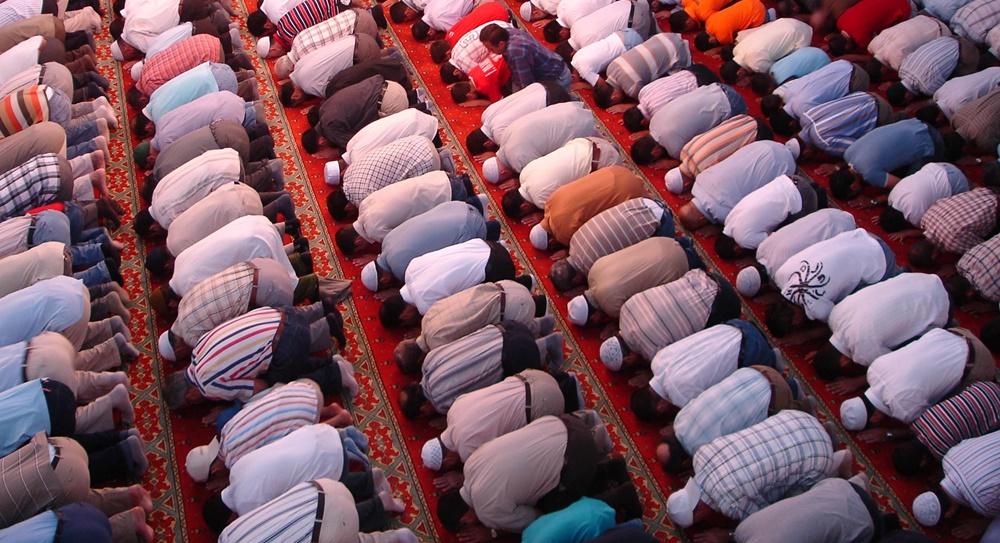
Many cultural Muslims treat formal daily prayer quite casually. They consider the prayers merely as a means of accumulating good points on their record. Consequently, some only pray twice per year at the two annual celebrations ad al-Fitr and al-Adha), others only during the month of fasting, Ramadan. and yet others only pray the weekly Friday congregational prayer. Some regularly miss one or more of their daily prayers while others pray all five before going to bed at night. Yet others delay beginning regular prayers until their old age.
The prayer is usually made very quickly without the least thought being given to what was said and done. The Prophet ﷺ instructed those who prayed quickly to redo their prayers, because quick prayers are not counted.
For cultural Muslims, the prayer has become such a ritual that in some parts of the Muslim world a special method of prayer was invented for women, distinct and different from the prayer of men. However, the Prophet ﷺ instructed his followers to pray as he prayed, without making any distinction between males and females.
Consequently, non-Muslims will observe cultural Muslims praying regularly, yet being most dishonest and corrupt in their dealings with others. Yet, Allah has stated in the Qur’an that regular prayer prevents corruption,
Indeed formal prayer prevents evil speech and evil deeds.
Quran 29:45
Thus, if one’s prayers do not prevent them from corruption, they are not performing the prayers which God has commanded.
…in some parts of the Muslim world a special method of prayer was invented for women…
The character which Salah builds is:
a) God-fearing: An individual who is conscious of God will question himself or herself prior to doing every act, “Is this act pleasing to God or not?” God consciousness is the ultimate basis of righteousness, as it is that consciousness alone which will prevent an individual from evil, even when it is at his or her own expense.
b) Good speaking: True believers will not be noted for obscene language, slander, backbiting, lies, etc. During formal prayer, one is restricted to saying only good words as training for life beyond prayer. The Prophet ﷺ said, “Let whoever believes in Allah and the last day either speak good or be silent.’
c) Good acting/behaviour: During formal prayer, the believer acts only in accordance with God’s instructions. All of his or her body parts conform to set movements designed to train the believer to obey Allah during the periods between the prayers. Consequently, what he or she looks at, hears, touches, walks to will be good. And the believer’s interaction with people will be amicable. The Prophet ﷺ emphasized this concept saying, “The religion is comprised of good social dealings.”
– Excerpt from The Clash of Civilisations by Dr Bilal Philips
HISTORY
Saudi Arabia Restores Historical Mosques In Latest Renovation Project
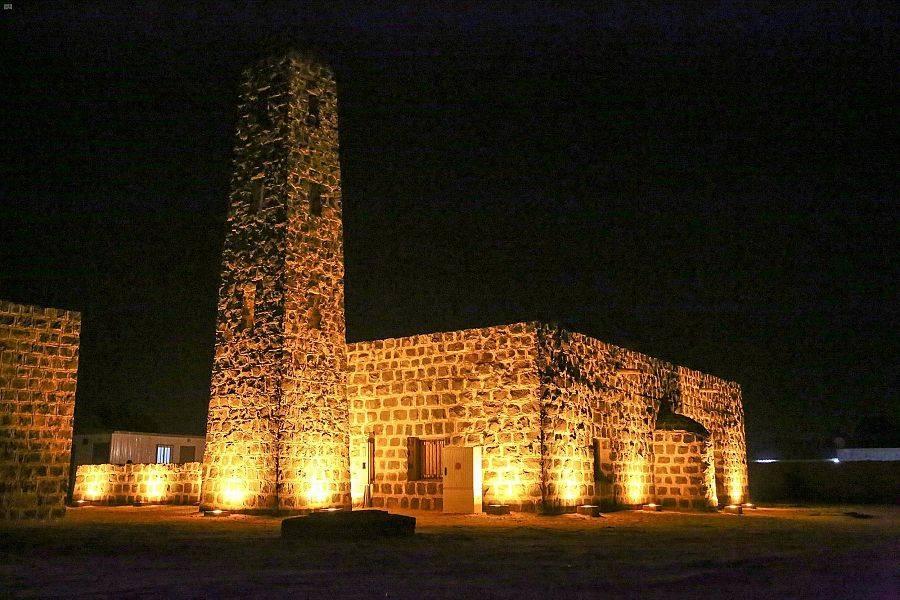
Saudi Arabia launched the second phase of Prince Mohammed Bin Salman Project for Historical Mosques Renovation, where mosques with historic significance are renovated to their original architectural state using modern construction methods.
The ambitious project targets the renovation and development of a total of 130 historical mosques in several phases in various regions of the Kingdom.
The first phase was announced in 2018, where 30 mosques were restored at a cost of nearly 50 million riyals ($13.3m). The age of the oldest historic mosque restored was 1432 years. One of them was established in the era of the Prophet’s companion Jarir Bin Abdullah Al-Bajali, namely Jarir Al-Bajali Mosque in Taif governorate.
The second phase of the project, which began this year, covers 30 historical mosques which were chosen on the basis of their historical and heritage significance. They are either related to the Prophet’s biography or the Islamic caliphate or the history of Saudi Arabia.
Among the mosques to be renovated is Masjid Al Bay’ah (Mosque of the Pledge), which was built at the request of Caliph Abu Jaafar Al Mansur in 144 AH, around 761 CE in the Gregorian calendar.
It was constructed at the site where the Ansar of Madinah pledged their allegiance to Prophet Mohammed ﷺ in the year 621 CE. The mosque’s unique architectural features were unearthed 16 years ago during the expansion project of the Jamrat Al Aqaba in Mina. The area of the mosque after renovation will remain the same at 457.56 square meters, and it will have a capacity of 68 worshippers.
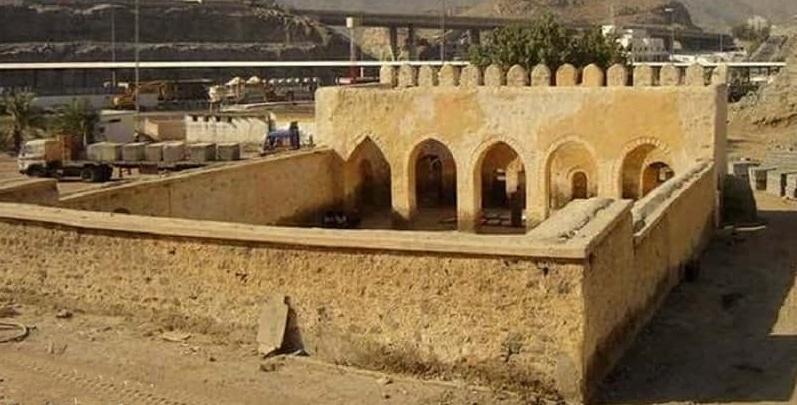
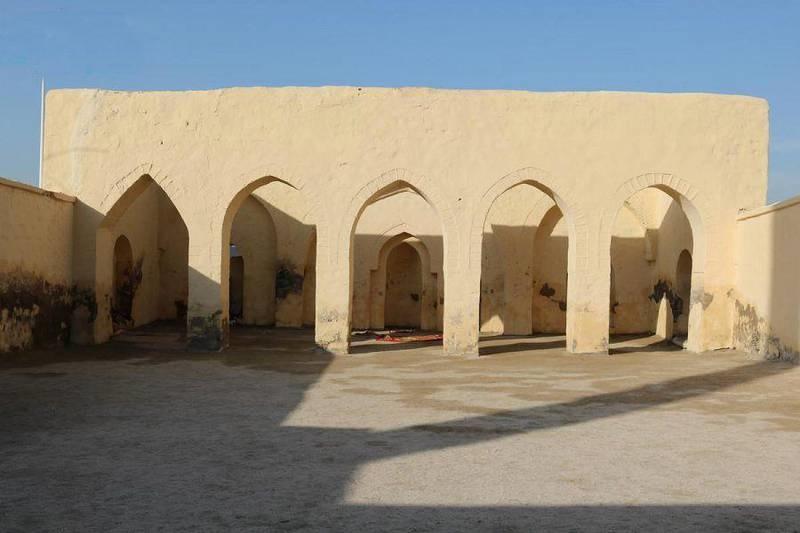
Masjid Al Bay’ah
Al-Fath Mosque in Al-Jamoum was also built centuries ago. It is believed that Prophet Muhammad most probably prayed in this mosque in the year of conquest. The mosque was renovated in 1998 after several years of neglect. It will now be expanded from 455 square meters to 553 square meters, to increase its capacity from 218 to 333 worshippers.
The crown prince’s project is part of the Kingdom’s Vision 2030 plan to preserve the country’s heritage while using these ancient structures to inspire the design of new mosques.
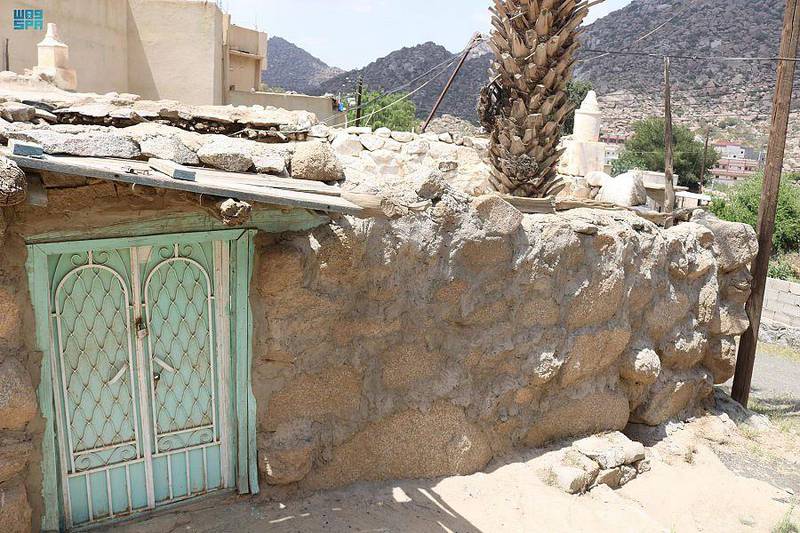
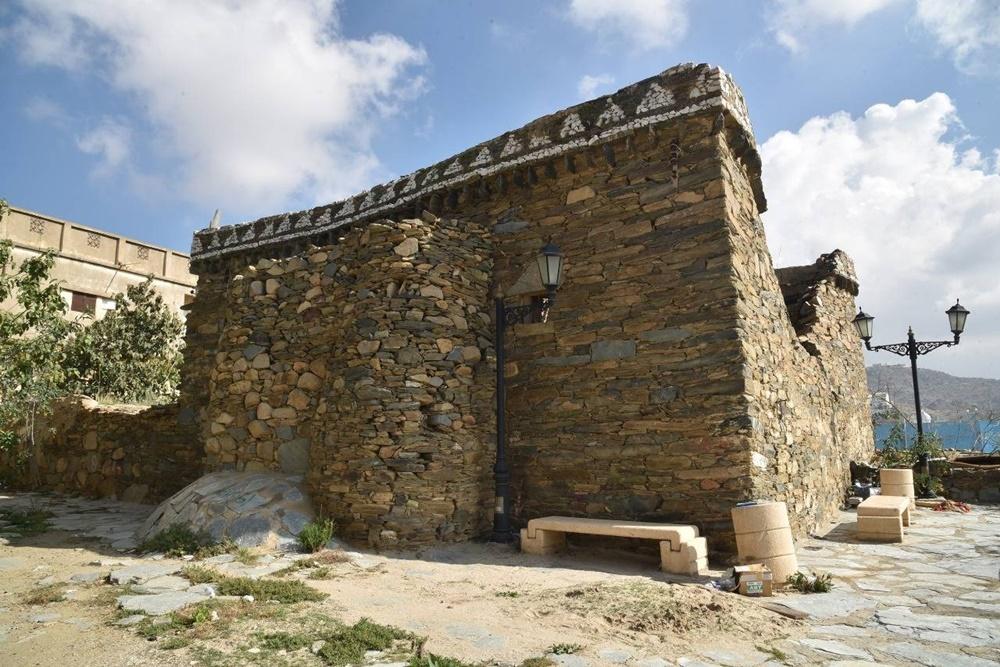
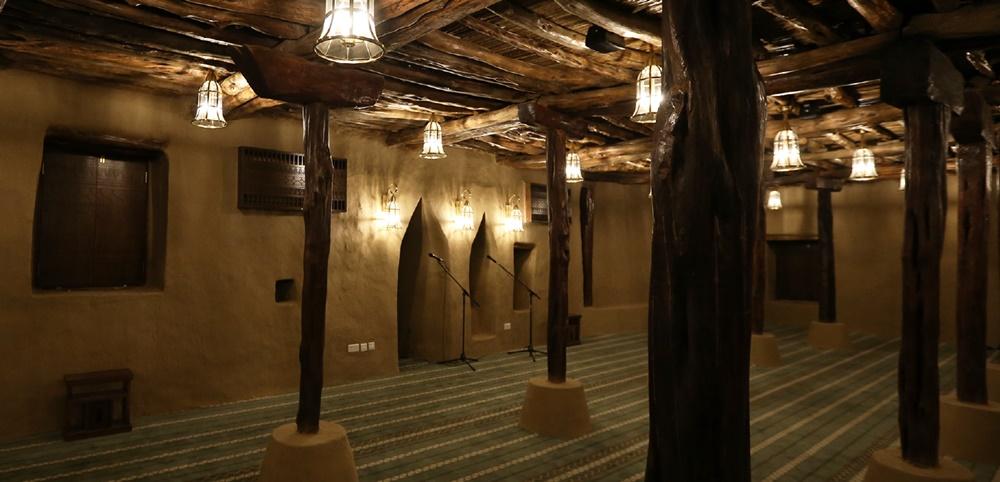
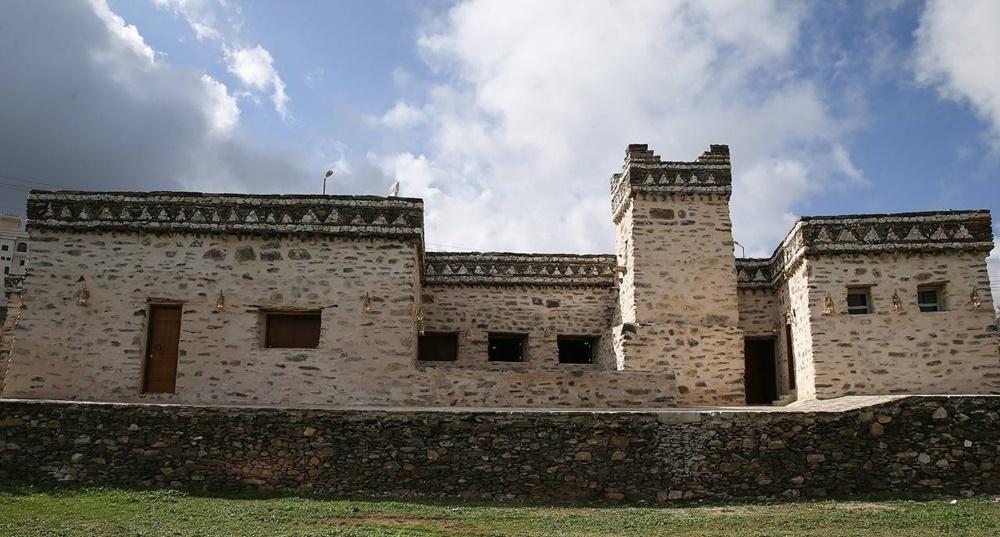
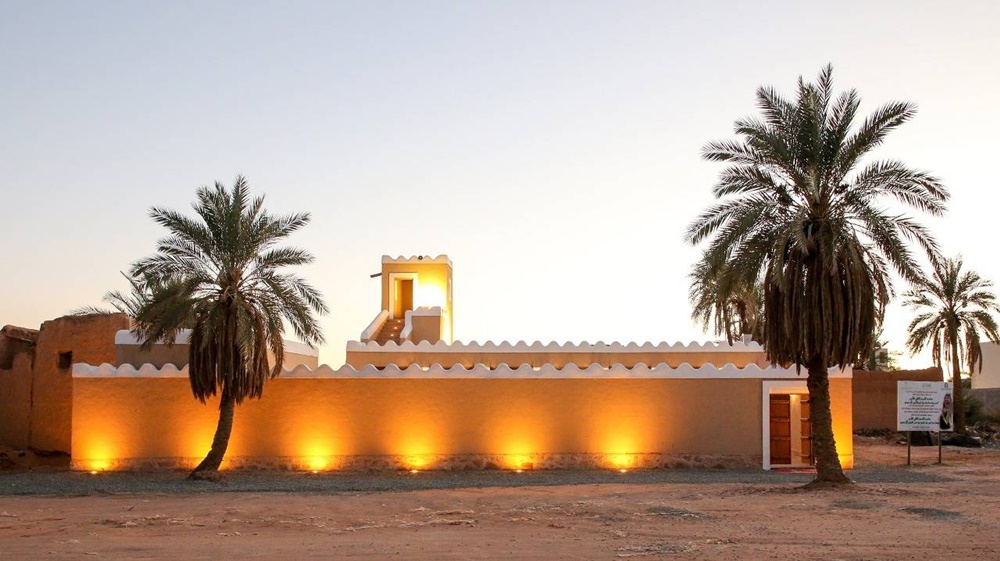
The Life of Tariq bin Ziyad
The conqueror of Spain
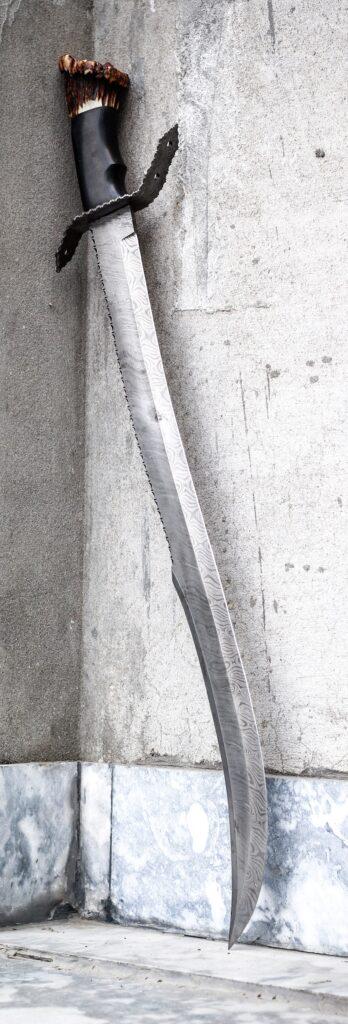
Tariq bin Ziyad is known as the conqueror of Spain and is recognized as one of the greatest Muslim commanders of all time. However, there is relatively little information about his origins or nationality.
There are three varying accounts of his origins: He was a Persian from Hamadan; he belonged to the Sadif clan; he was a Berber from Algeria. Spanish and Arab historians believe he was a slave of the emir of North Africa, Musa bin Nusayr, although his descendants dispute this claim.
Practically all information relating to Tariq is dated from 711 onwards as this is the year that he launched his invasion of Spain.
In the year 711, an oppressed Christian chief went to the governor of North Africa, Musa ibn Nusair, to ask for help to overthrow King Roderik. Musa responded by sending his finest general, Tariq bin Ziyad, with an army of around 10,000 troops.
When Tariq landed in Gibraltar in May he told his army to ‘burn their boats.’ They obeyed without question even though the enemy numbered 100,000. Tariq requested reinforcements and received an extra 7,000 men. Despite the numerical disadvantage, he won a brilliant victory at the Battle of Guadalete in July where the Spanish King Roderic was killed.
Tariq listened to experienced generals in his army and divided his troops into four divisions as they chased the defeated enemy to Toledo. They soon conquered Cordoba, Granada, Toledo and Guadalajara. When Musa heard about the success, he traveled to Spain with an army of 18,000 men in 712.
Together, the two generals conquered approximately two-thirds of the Iberian Peninsula as Saragossa, Barcelona, and Portugal were quickly taken. The Muslim army even made its way to France and conquered Lyons. It was the beginning of Muslim rule in Spain until 1492.
Hispania fared well as a conquered state by all accounts. The Muslims apparently didn’t confiscate estates or properties and imposed a system of taxation that was eventually modeled by the West. Serfdom was abolished, and a system of fair wages was introduced. Spain ultimately became one of the most prosperous nations in Europe at the time and by the 10th century; the capital Cordoba was one of the continent’s richest cities with a population of over 1 million people.
Tariq and Musa remained in Spain until Caliph Al-Walid I ordered them back to Damascus in 714 where they were honored. However, the Caliph was near his death and passed away in 715. His successor, Sulaiman, was less enamored by the two commanders and both men were accused of misappropriation of funds. Little else is known about the rest of Tariq’s life, only that he died in obscurity in Damascus in 720.
Reference: History Collection
SCIENCE
The Earth Is Spinning Faster Than Usual
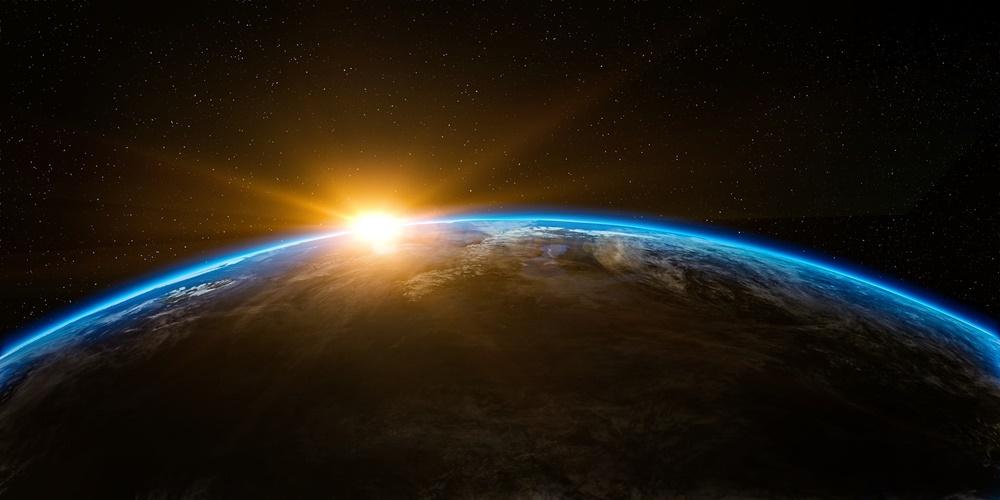
We know that the Earth takes up to 24 hours to spin around its axis. However, scientists have recently noticed that the earth has picked up some speed. Consequently, some days are now shorter than they used to be.
The feeling this news arouses is more familiar than we care to admit. All of us have felt hours in our day shrinking and time flying by. This also calls to memory one of the sayings of the Prophet ﷺ that Abu Hurayrah reported:
“The Hour will not begin until time passes quickly, so a year will be like a month, and a month will be like a week, and a week will be like a day, and a day will be like an hour, and an hour will be like the burning of a braid of palm leaves.” [Ahmad]
The phrase here “time passes quickly” may be interpreted literally or metaphorically.
Metaphorically, it may refer to barakah (blessing) disappearing from time, which is something we all can attest to. Its literal manifestation is now occurring.
The earth ideally takes 24 hours to complete its rotation and every 24 hrs it is a new day. However, on the 29th of July, our planet took 1.59 milliseconds less to rotate on its axis. Thus the day ended before its usual time.
This is not just a one-time fluke. On 19th July 2020, the earth completed its rotation 1.47 milliseconds before time, and according to International Earth Rotation and Reference Systems (IERS), in 2020 alone, Earth recorded 28 shortest days.
So, this has been happening for some time now. The question ‘why?’ is being explained by scientists in varied ways. Some suggest it could be the result of climate change that has disrupted the melting and refreezing of ice caps on the world’s tallest mountains, which in turn led to less weight on the poles.
Apart from climate, Earth’s inner and outer layers, oceans, and tides are also suspected to be the reasons.
The scientists have also blamed what is called ‘Chandler Wobble’ which is basically a change in the spin of Earth on its axis. The speed with which our planet rotates on its axis has varied throughout history. 1.4 billion years ago, a day would pass in less than 19 hours, compared to 24 hours today. So, up until now, days on earth were getting longer rather than shorter.
But the planet is currently spinning faster than it was half a century ago. Any slight variation in the speed of rotation affects the global timekeeper – the atomic clock, which would require leap seconds to be added. Or as in this case, a negative leap second to potentially occur.
On 19th July 2020, the earth completed its rotation 1.47 milliseconds before time
Taking off a second from a day may not seem much in words but it could have a devastating effect on the software relying on timers or schedulers. While the impact of a negative leap second has never actually been tested on a large scale, the introduction of leap seconds has taken place before. Adding a leap second can not only affect your clock, but it could also impact internet servers.
For example, back in 2012, Reddit experienced a massive outage because of a leap second. Its site was inaccessible for 30 to 40 minutes due to changes in time patterns. It sparked hyperactivity on the servers, which locked up the machines’ CPUs. Many other internet companies shared similar experiences.
ISLAMIC FINANCE
Understanding Inflation from an Islamic Perspective
By Faraz Omar

Inflation has gripped everyone around the world. We haven’t seen such inflation rates in decades. Economists are divided over the reasons for the inflation (they always are). To be fair to the economists, it is not really possible to accurately predict, explain, or solve inflation, because for the most part it is not in our hands.
Alhamdulillah Islam has always provided us with right guidance in every aspect of life, and, in the topic of inflation, it is no different.
The following is an incredible hadeeth and shows how Islam is truly divine.
Narrated Anas bin Malik:
When prices were high in Madinah during the time of the Messenger of Allah ﷺ, the people said, “O Messenger Allah, prices have become high, so fix them for us.”
The Messenger of Allah ﷺ replied, “Allah is the One Who fixes prices, He is the One Who withholds, He is the One Who gives, and He is the One Who provides. And I hope that when I meet Allah, the Most High, none of you will have any claim on me for an injustice regarding blood or property.” (Collected by Ahmad, Tirmidhi, Ibn Majah, Abu Dawud and authenticated by Ibn Habban)
When the Prophet ﷺ was asked to fix prices, he refused to do so and referred the cause of inflation to Allah, the Most High.
Scholars point out that an increase in demand or a decrease in supply are all in the Hands of Allah.
Shaikh Ibn Uthaymeen explaining the above hadeeth said that fixing prices in general is not permissible. There is an exception to this rule, however. In the case of a monopoly of a product or service, the price can be fixed to protect consumers from being oppressed and being charged excessively. The shaikh pointed to another hadeeth in Sahih Muslim as proof of this exception.
Increasing interest rates however hasn’t brought us the desired results in the past…
What fixing prices led to in Venezuela
It is relevant to note here that Venezuela in the recent past tried to combat inflation by fixing prices of goods. This eventually became disastrous for the country.
The domestic industry was wiped out because they could not produce goods at fixed prices.
The country then had to import goods, and when oil prices fell in 2014, the country couldn’t afford to import anymore. The economy collapsed.
Our current inflation and the response
In our current scenario, it looks like the global supply chain disruption, high consumer demand, the war in Ukraine further affecting our supplies, and high energy prices have all led to the inflation we are in. None of which is in our control.
Because we live in a Riba-based economy – our paper money comes from interest-based debt, governments around the world try to respond to inflation with increasing interest rates. Increasing interest rates will increase the cost of borrowing, which will reduce the supply of money in the market, and which in turn is supposed to reduce inflation.
Around 80% of money supply in the market is created through loans that private banks give out. Surprised? Unfortunately, this is the way our Riba-based economy functions.
Increasing interest rates to combat inflation however hasn’t brought us the desired results in the past, which is why many leading economists have concluded (not without disagreement though) that money supply doesn’t necessarily cause inflation. Looking at past data, correlation between money supply and inflation has been ruled out. Some have attempted to explain that if supply of goods and services incre ases proportionally then the increase of money in the market won’t cause inflation.
There have been rare times during wars when hyperinflation was caused by governments printing money like there was no tomorrow.
It’s also important to note that governments today aim for a moderate inflation rate, around 2%, every year. They claim this helps the economy grow. And when things go wrong, they can cut interest rates to encourage borrowing and stimulate the economy. They cannot do this if inflation is low and interest rates are near zero.
Japan’s deflation problem
Let’s look at another real-world example.
Japan, for the last few decades, was facing the problem of deflation, the opposite of inflation. Prices were constantly coming down or staying the same. Why is this a problem? Because it can mean low demand, low supply, and therefore a sluggish economy.
The late Prime Minister Abe, from 2014-2020, tried some of the textbook solutions to increase inflation rates. He pumped a lot of money into the market. The currency weakened but nothing happened to inflation.
He continued to pump money into the market. Still nothing happened.
Conclusion
What does all this mean? Allah knows best about inflation. We haven’t a clue about it. Sure, we must learn and do whatever we can to solve it. But we should also know that, even with all the advancement, none of us controls a thing. We must turn to Allah for help for the situations we find ourselves in. As Prophet Muhammad ﷺ said, “Allah is the One Who fixes prices, He is the One Who withholds, He is the One Who gives, and He is the One Who provides…”
He is the Supreme who is in perfect charge and control of the universe.
References and further reading:
- What Causes Inflation and Price Hikes? Explained by Shaykh Uthaymeen – Masjid Tawheed wa Sunnah
- Inflation? Not in Japan. And That Could Hold a Warning for the U.S. – The New York Times
- How is money created? | Bank of England
- How Not to Fight Inflation | The New Yorker
- Money Printing and Inflation: COVID, Cryptocurrencies and More | Nasdaq
- Inflation: Prices on the Rise | IMF
- Myth-Busting: Money Printing Must Create Inflation | CFA Institute Enterprising Investor
- Jerome Powell Is Wrong. Printing Money Causes Inflation. – WSJ

Limited free articles. Subscribe for full access.

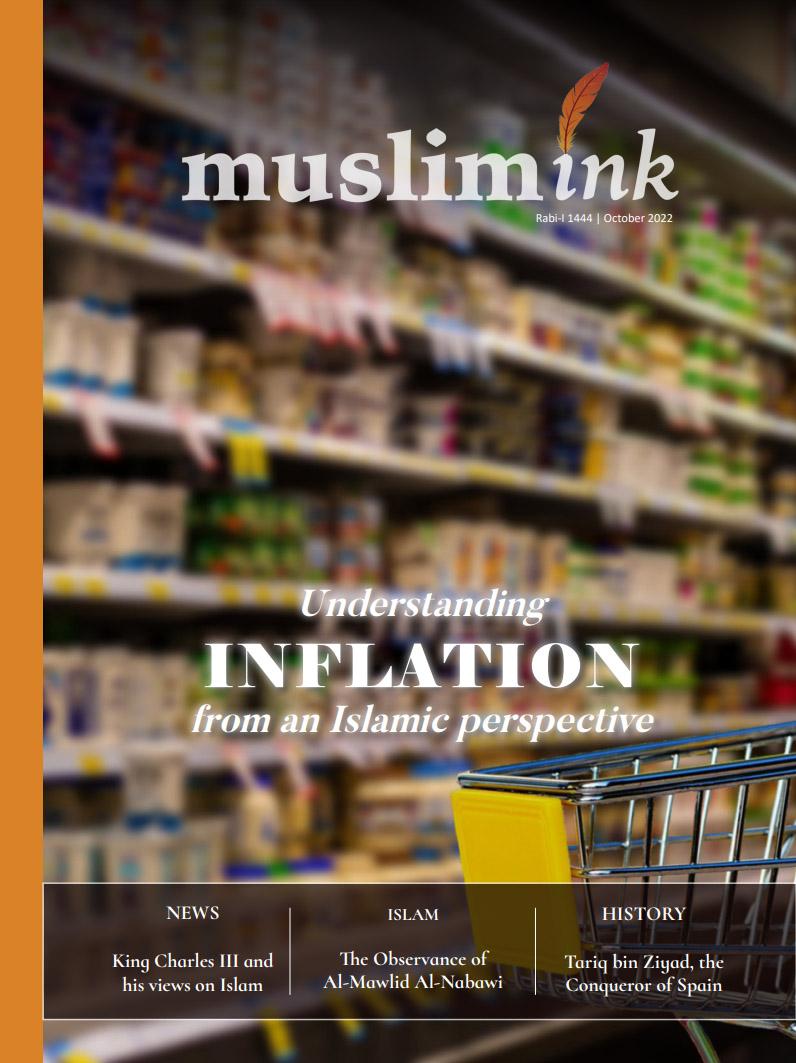
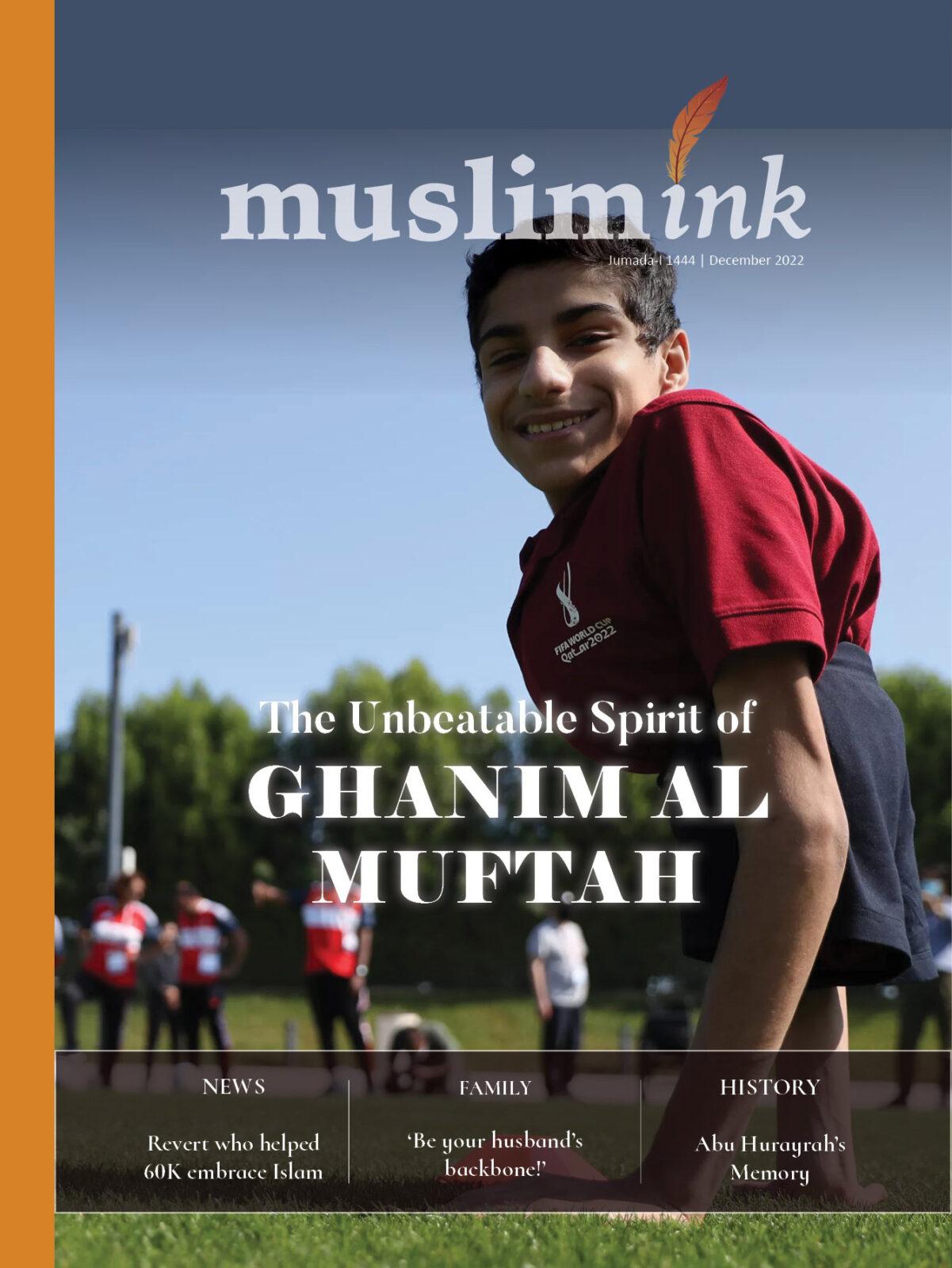

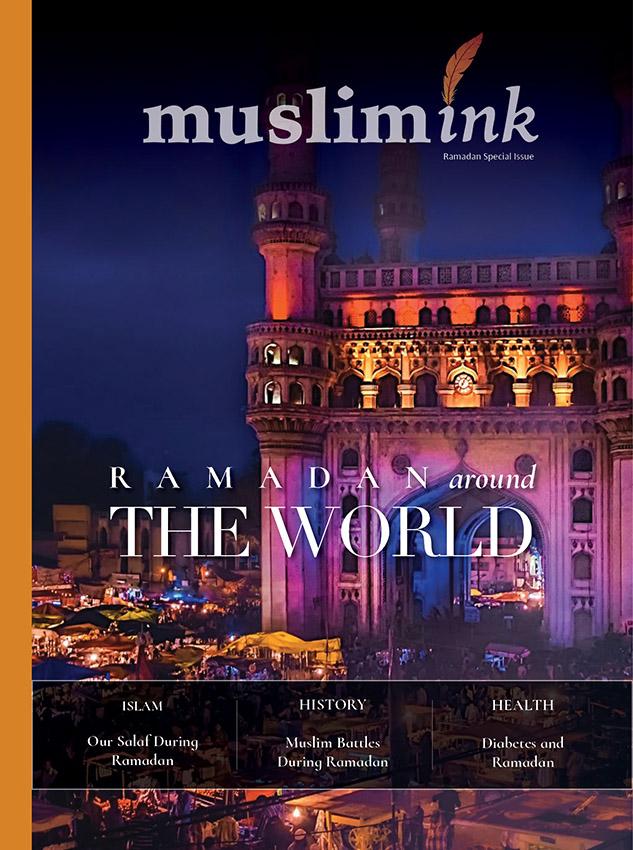
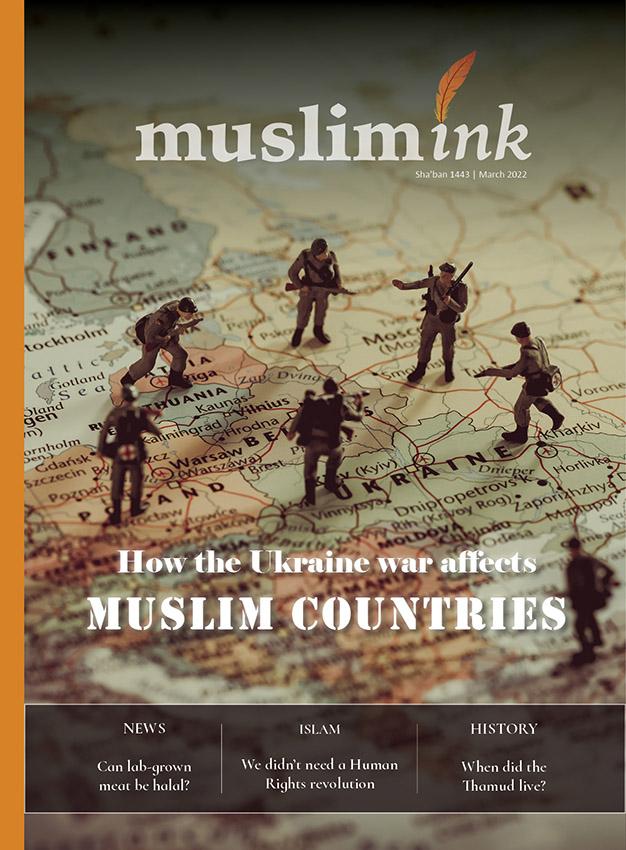
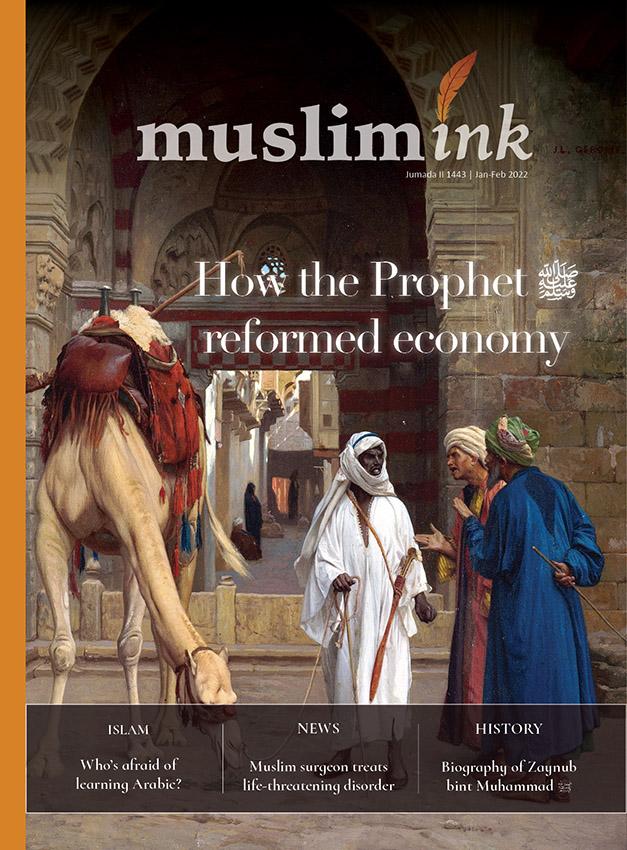

 Dr. Bilal Philips
Dr. Bilal Philips